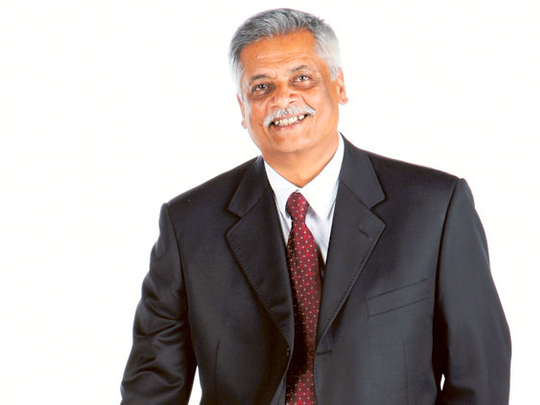
Dubai: He’s a happy man. You can feel it when you meet him. The joy is evident - quite a rare occurrence in this day and age of harrassed urbanites. Meet Bala Krishnan, the Circulations Sales Manager at Gulf News for nearly two decades.
Twenty six years ago he joined Gulf News, at its Abu Dhabi office, as the Circulations Branch Manager. That was his first job in a media house after years at a multi-national.
It didn’t take him long to understand that the role was all about marketing strategies, sales and logistics. The job had him managing field forces and dealing with customers of different cultural backgrounds and nationalities.
Compared to the digitalised, fast-paced work today, most of the work back then was manual. But, the biggest joy for him were his field forces and connected experiences.
He said: “I remember an instance when a shabbily dressed man on a street came up to me and told me that he had not eaten for two days. Not being paid at a remote farm that he worked, he had come looking for a job to Abu Dhabi. I gave him some money and asked him to return to me once he had his meal. I helped him become a newsboy, today at 63 years, Abdul Qadeer still works with us. He is now probably the oldest newsboy on our Abu Dhabi team.”
In 1990, three years after he joined Gulf News, the Arab world witnessed the first Gulf War. Iraq’s invasion of Kuwait created a lot of fear.
“I remember we bought masking tapes to use on our windows, to keep the glass from shattering, just in case there was a sudden attack. We heard the first launch of jets at 3am, one day, during the war. However, newspaper sales saw an upsurge during this period, people wanted to know how critical the situation was. I believe Gulf News played a good role in settling the fear in people, yet keeping them updated on what was truly happening.”
In 1995, Krishnan quit, to move to Canada with his family. However, in 2000 he returned to the UAE. In 2002, he re-joined Gulf News and has stayed on, for 11 years.
He has an extremely busy daily schedule, which includes strategy development, identifying new consumer areas, creating distribution teams and assigning distributors, along with meeting the daily 6am target to deliver the newspaper to customer’s doorsteps.
Circulation staff arrive at the the newspaper plant in Jebel Ali at 9:45 pm to pick up copies for delivery. The first edition of the paper is delivered to the airport. Last minute stories go into the second or third edition. Home deliveries start at 12:45 am.
He recounts with an almost childlike excitement his experience on the night of July 2012, when the new Gulf News plant in Dubai Investment Park printed its first copies of the newspaper, in the Berliner format.
He said: “It was thrilling to watch the giant machine churn out copies at a phenomenal speed... it was as if out of a sci-fi movie. Pre-programmed robots were walking between aisles, picking up newspaper rolls, placing them in machines ....”
The technology is meant to further improve the quality of the product that an end-user receives. But, the Berliner received some negative feedback, initially, according to Krishnan. The waters have appeared to calm.
He said: “We circulate 120,000 copies in the UAE ... the reader demographics have remained quite unchanged over the years. Readers from the Sub-continent largely Indians, Pakistanis, Sri Lankans and Bangladeshis make up about 40 to 45 per cent of the readership, Westerners comprise 20 per cent, and we are experiencing a slow increase in the Filipino audience, recently.”
Krishnan added that his almost 20 years journey at the newspaper has been a fantastic experience. “ My work makes me happy!”












